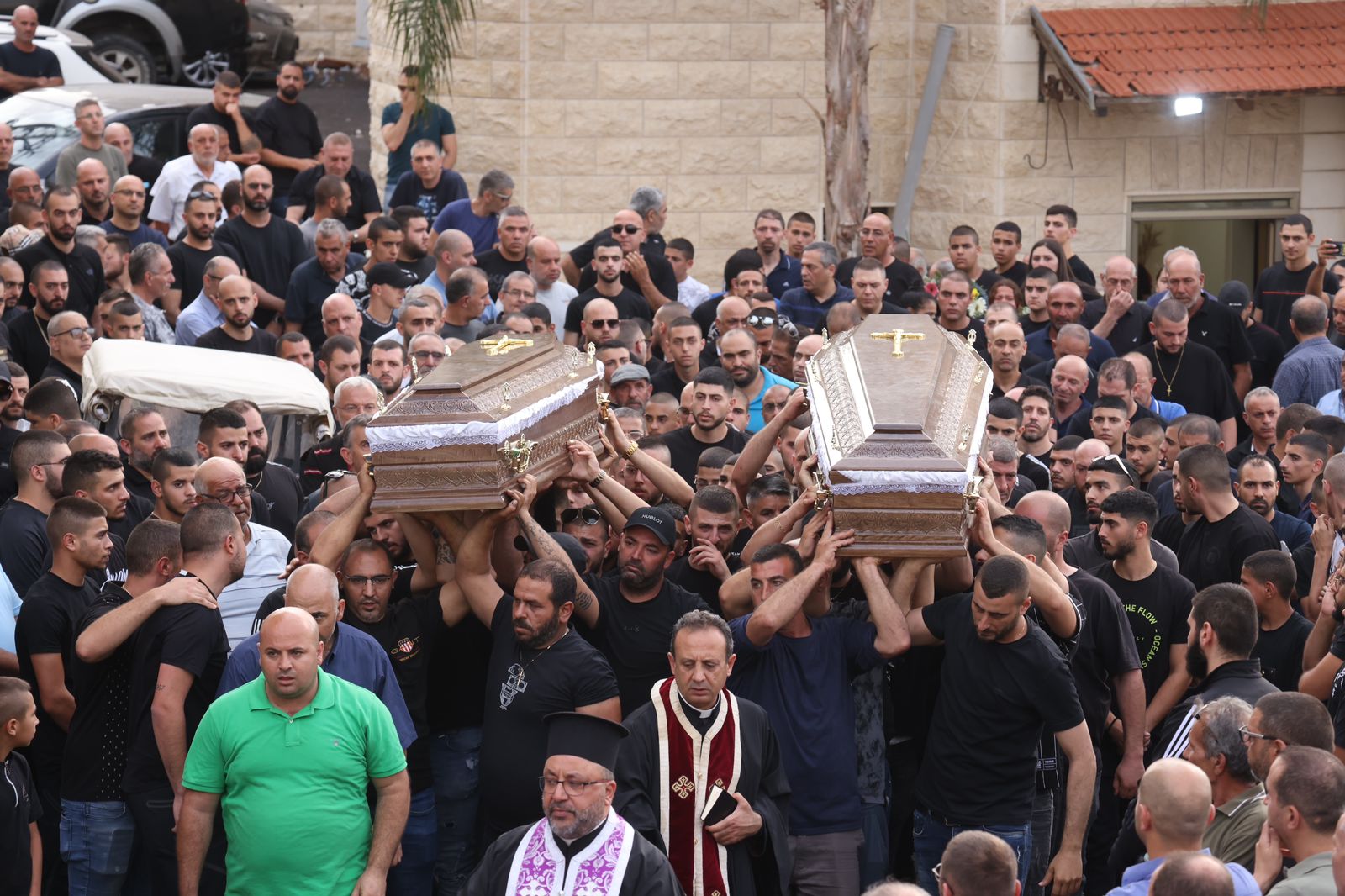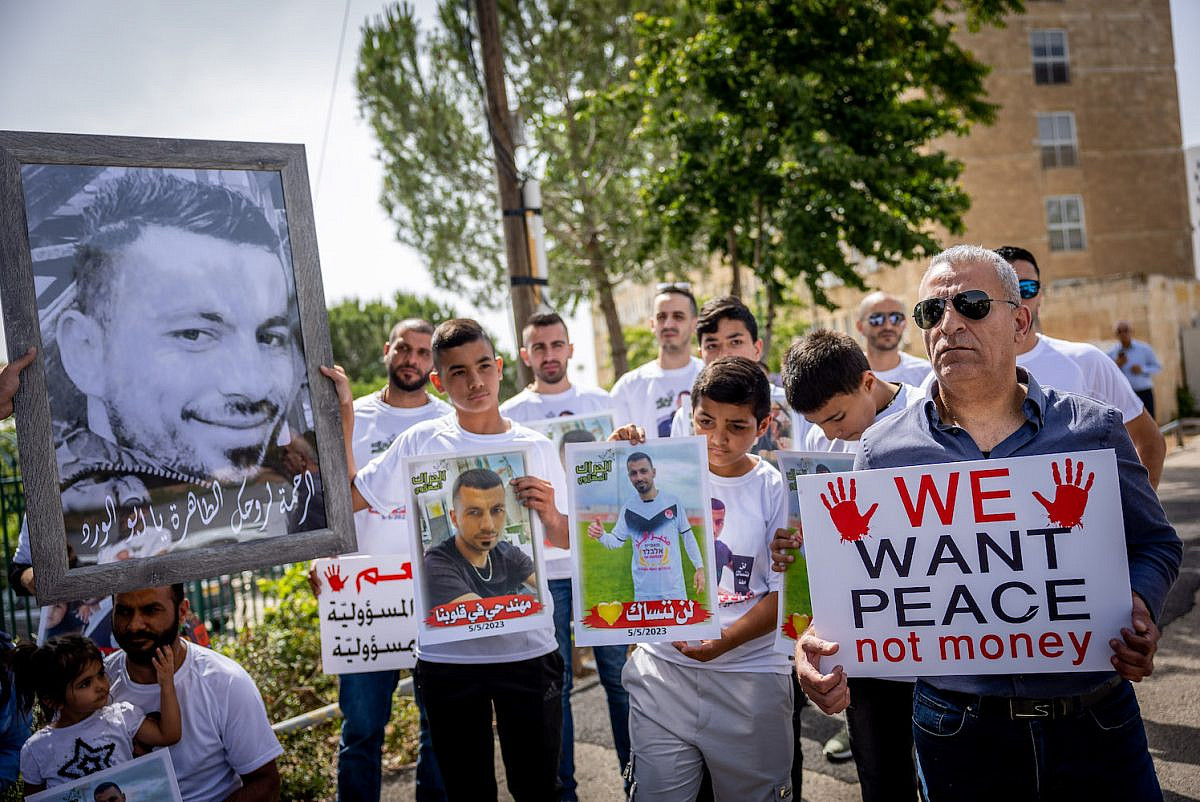This article originally appeared in “The Landline,” +972’s weekly newsletter. Subscribe here.
The plague of gun violence among Israel’s Palestinian citizens has returned to the spotlight in recent weeks, after a spree of shocking murders in several towns pushed this year’s death toll to over 100 people. Unfortunately, the debate over what to do about it appears to be stuck on replay. Photos of the deceased spread on social media in what has now become a weekly trend. Arab politicians staged a feckless protest outside the Prime Minister’s Office. Government officials made their usual calls to recruit the Shin Bet in the fight against local gangs. It is a dance we have watched for years, all while the guns keep spreading and the bodies keep piling.
For two decades, organized crime has created a shadow world in Arab localities across Israel, fueling a lucrative black market, pervasive presence of firearms, and a chauvinistic ethos of “might is right.” Feuds between Arab gang members — or indeed, any civilian owning a pistol — have turned into murderous free-for-alls, such that anyone from a spouse to a distant relative can become a target. More than any other issue, personal safety is now the number one concern of Palestinian citizens, with some feeling they can hardly walk down the street, visit family members, or send kids to school without worrying if they will make it back home unharmed.
Yet there is something deeply troubling about the way solutions to the violence are being deliberated, even among Palestinian citizens. The dominant thinking — echoed from Knesset halls to living rooms — is that what is needed to combat the problem is the intervention of the Israeli police and security agencies. Pointing to previous operations against Jewish crime syndicates, as well as the state’s massive capacity in dealing with “terrorism,” many insist that law enforcement authorities are merely absent from the Arab sector, and should therefore step in to bring order.
These security forces, however, already have a constant presence in Arab communities; they’re just not there to serve Arabs. Among other roles, the national police are essentially tasked with preventing Palestinian citizens from disrupting the Jewish public sphere; the Border Police are focused on chasing down Palestinians from the occupied territories without permits; and the Shin Bet is charged with undercutting any form of Palestinian political activity, whether it is a militant cell or a protest in a school. Despite claims by officials last week, Israeli authorities have more than enough resources to tackle crime and violence in Palestinian society — they simply don’t want to.
Crucially, the fixation on policing has funneled the public into a narrow conversation that avoids the real roots of today’s crisis. Since the Nakba, Israel has relentlessly swallowed Palestinian land and encaged Arab localities through a matrix of discriminatory laws and planning policies. As the years went by, this chokehold stoked increasing frictions within and between families as they scrambled for spaces to build their homes and livelihoods. The lack of zones for agriculture and industry, which the state bestowed to nearby Jewish communities instead, thwarted the potential for local economic growth. Traditional social ties dissolved into individual survivalism, hastened by the state’s violent repression of Palestinian national consciousness especially after the Second Intifada.

It is this dearth in Arab localities — fostered by a regime that is designed to rob the land of one society for the exclusive benefit of another — that has enabled gangs to cultivate an economy and subculture built on power and predation. In a major report led by the Baladna Association and Coventry University, researchers explained how many Palestinian citizens, especially young men, are being drawn to guns and crime for their promise of social status, financial opportunity, and physical protection in an environment that otherwise cannot provide these needs. All this has festered under the eyes of the Israeli authorities, and — as security officials have admitted themselves — often with their cooperation.
The Palestinian community has not been passive in the face of this disintegration. Activist collectives and local initiatives have sprung up in many Arab towns, often led by youth, to educate and steer their peers away from crime and pressure their society to turn against the criminal underworld. But what chance do the words of a young man have against another man threatening him with a gun? How can women or queer activists persuade misogynistic and patriarchal clan leaders to disarm themselves? What incentives can convince a gang member who hails from poverty to abandon the rewards of racketeering? And what future can Palestinian citizens promote when the state ruling over them shatters their visions at every turn?
All this is why, for Palestinians, the question of crime can never be disentangled from the realities of colonialism — as much as some would like to try. At last week’s anti-government protest in Tel Aviv, for example, Israeli organizers invited the lawyer and scholar Rawia Aburabia to speak about the rising violence in Arab communities, but on the condition that she said nothing about the occupation.
“If this is what freedom of speech looks like in a protest for democracy for Jews only, in which the power structures of ethnic nationalism and the policing of the speakers are reproduced, then I don’t know what to say anymore,” said Aburabia, who turned down the invite. The protest leadership, she added, “is not only indifferent to the oppression of the Palestinians, but chooses to be on the oppressive and silencing side.” Others who think that the murders of Palestinians in Israel can be separated from the system that seeks their erasure in every other facet of life should take note.


